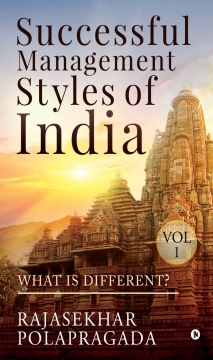
- Discover books
- For Writers
-
For Writers
-
Indie Author Championship
-
Challenges
Writing Contests
- Get Started

"It was a wonderful experience interacting with you and appreciate the way you have planned and executed the whole publication process within the agreed timelines.”
Subrat SaurabhAuthor of Kuch Woh Pal -
-
-
IN
- India
- Singapore
- Malaysia
- 0
Rajasekhar Polapragada
Rajasekhar Polapragada is a post-graduate in chemical engineering, who studied at Premier Institutes of India and did business management at Jamnalal Bajaj Institute. He has over four decades of experience in the oil industry in India and abroad. He is currently the Managing Director of Economic Engineering Excellence. His experience in multi-national companies like Shell, Aramco, Bapco, and Indian Oil companies Hindustan Petroleum and Essar Oil exposed him to different management styles in different countries. The author had closely observed the industry leaders, their management & Read More...
Rajasekhar Polapragada is a post-graduate in chemical engineering, who studied at Premier Institutes of India and did business management at Jamnalal Bajaj Institute. He has over four decades of experience in the oil industry in India and abroad. He is currently the Managing Director of Economic Engineering Excellence. His experience in multi-national companies like Shell, Aramco, Bapco, and Indian Oil companies Hindustan Petroleum and Essar Oil exposed him to different management styles in different countries.
The author had closely observed the industry leaders, their management & leadership styles. While results are main focus in the west, relations are the priority in India. Both the west and even many Indians consider India as a developing country, while the author wants to remind us of the ancient Indian wisdom, Even China looked up to India till 1000 AD for their ethical and intellectual stimulus. The author is one among the group of intellectuals who believe Indian wisdom benefits all human beings of the planet. “Let all be Prosperous!” is the ancient Indian wisdom.
Read Less...Crop your profile image

SUCCESSFUL MANAGEMENT STYLES OF INDIA
Books by Rajasekhar Polapragada
As the quest to be the best is the main principle of evolution, Indian enterprises should strive to improve continuously. Indians have to assimilate and adapt the best practices followed elsewhere in the world. This is possible only if employees, employers and leaders strive to be the best.
In this Tri series commentary on Successful Management Styles of India, Volume 1 deals with “What is the difference?”. The other two volumes cover
As the quest to be the best is the main principle of evolution, Indian enterprises should strive to improve continuously. Indians have to assimilate and adapt the best practices followed elsewhere in the world. This is possible only if employees, employers and leaders strive to be the best.
In this Tri series commentary on Successful Management Styles of India, Volume 1 deals with “What is the difference?”. The other two volumes cover “How to be the best” and “Beyond Sustainability.”
Two policies and four principles are recommended in Vol. 1. The two policies are: offering the best quality of product/service and best price to the customer. The four principles are Transparency, Succession Planning, Empowerment and Compliance to Rulebooks.
The main objective of this book is to help students of business management, who have to face challenges and ground realities different from what they learnt in text books. Businessmen, who want to start new ventures in India, also need to know what works in India and what does not. This book is recommended for both these groups.

Are you sure you want to close this?
You might lose all unsaved changes.
Select from one of our global stores to continue
 India
India
 Singapore
Singapore
 Malaysia
Malaysia
Warning Message
The items in your Cart will be deleted, click ok to proceed.











